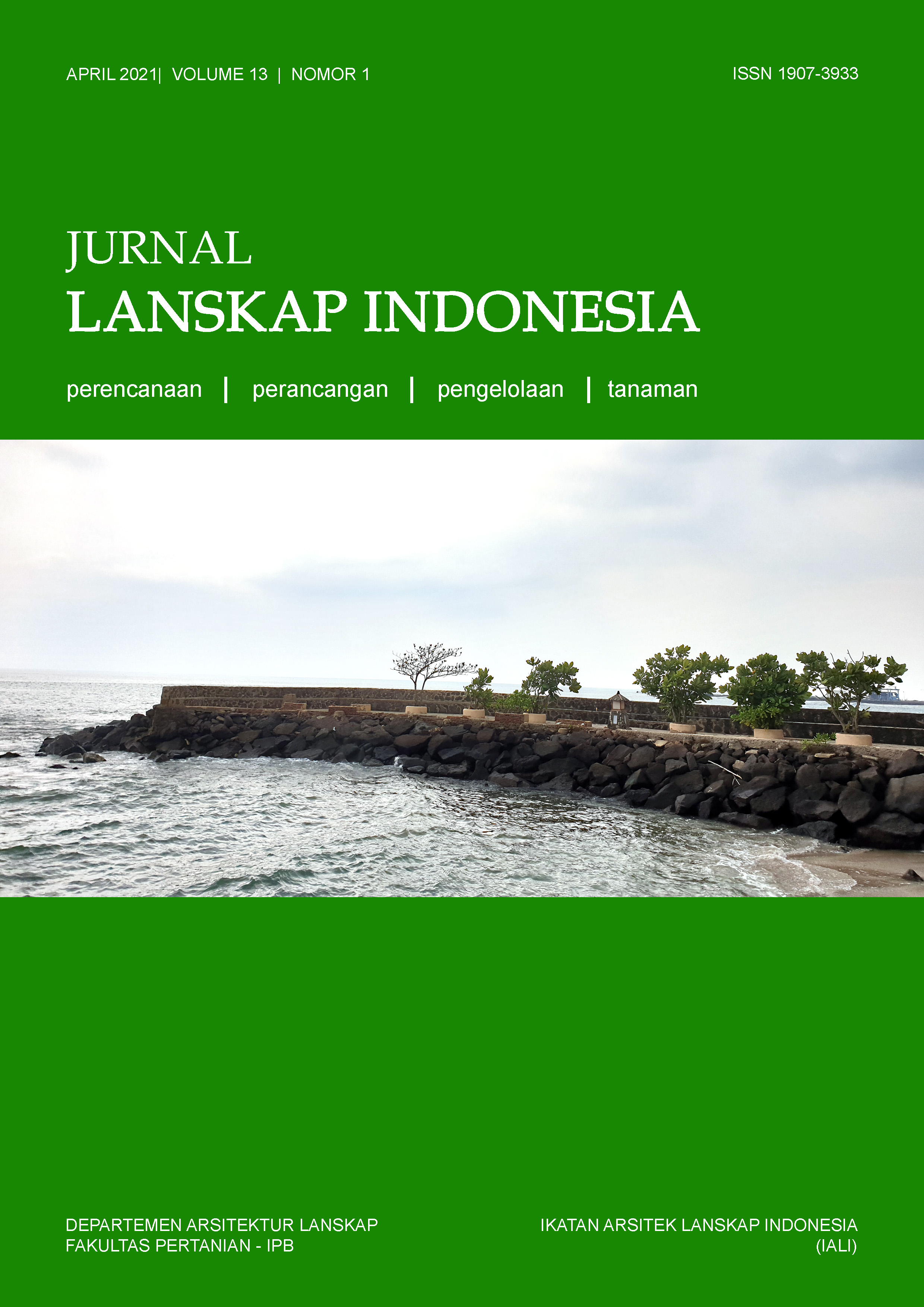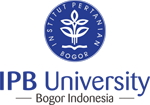Memotret Bentuk-bentuk Toleransi di Desa Kampung Kusamba, Karangasem, Bali
Abstract
Kampung Kusamba Village is a relatively small size village in the Bali Island with a majority Muslim population. The village area is surrounded by villages that are predominantly Hindu. The Kampung Kusamba is an example that tolerance in social life is actualized. This research emphasizes on documenting tolerance between Kampung Kusamba dwellers with the Balinese through architectural forms and folklores, myths, or any other oral histories. The research method used is qualitative. Data were collected using a purposive approach, utilizing an in-depth interview technique to resource persons and photographic surveyed for architectural forms. The analysis was carried out descriptively using an ethnographic domain analysis technique approach. Preliminary findings from this study were that physical architectural features that reflect the local culture are the same or almost the same as Balinese architecture. A form of tolerance was also found in the form of artifacts that reflected the diversity of the population of Kampung Kusamba in the past. Oral histories of the past as a manifestation of the intangible landscape also showed the attitude and tolerance of the people of Kampung Kusamba and the people who live in Bali respectively. Moreover, there was also a story that shows the position and special relationship of Kampung Kusamba with Klungkung Royal.
Downloads
References
BPS Kabupaten Klungkung. 2017. Kecamatan Dawan Dalam Angka 2017. Retrieved from Badan Pusat Statistik Kabupaten Klungkung website: https://www.m-culture.go.th/mculture_th/download/king9/Glossary_about_HM_King_Bhumibol_Adulyadej’s_Funeral.pdf
Bungin, B. 2017. Penelitian Kualitatif: komunikasi, ekonomi, kebijakan publik, dan ilmu sosial lainnya (2nd ed.). Jakarta: Kencana.
Hambali. 2018. Wawancara tahun 2018. Klungkung, Bali.
Mazilu, M., Lazar, I. 2014. The Cultural Landscape: Perception, Knowledge, Awareness and Support to The Development of a Sustainable Tourism. Geopolitics, History, and International Relations, 6(1), 123–132.
Nugraheny, D.E. 2019. Ini Tiga Sebab Menguatnya Sikap Intoleransi di Indonesia Versi Polri. Kompas.Com. Retrieved from https://nasional.kompas.com/ read/2019/11/16/07364551/ini-tiga-sebab-menguatnya-sikap-intoleransi-di-indonesia-versi-polri?page=all
Awalia, N.R., Nurhayati, Kaswanto, R.L. 2017. Kajian Karakter Pembentuk Lanskap Budaya Masyarakat Adat Kajang Di Sulawesi Selatan. Jurnal Lanskap Indonesia, 9(2), 91–100. https://doi.org/10.29244/ jli.2017.9.2.91-100 DOI: https://doi.org/10.29244/jli.2017.9.2.91-100
Parimartha, I.G., Putra, I.B.G., Ririen, L.P.K. 2012. BULAN SABIT DI PULAU DEWATA Jejak Kampung Islam Kusamba-Bali (A. A. Dwipayana, Ed.). Yogyakarta: Program Studi Agama dan Lintas Budaya (Center for Religious and Cross-cultural Studies/CRCS) - Sekolah Pascasarjana, Universitas Gadjah Mada.
Rozhkov-Yuryevsky, Y. 2013. The concepts of enclave and exclave and their use in the political and geographical characteristic of the Kaliningrad region. Baltic Region, 2(2), 113–123. https://doi.org/ 10.5922/2079-8555-2013-2-11 DOI: https://doi.org/10.5922/2079-8555-2013-2-11
Salain, P.R. 2015. Sebuah Pengalaman Konservasi Taman Sukasada – Ujung Karangasem sebagai Taman Air Terbesar dan Termegah di Bali. In G. M. A. Suartika & I. K. Pranajaya (Eds.), 25 Karya Arsitek IAI Bali dan IAA Universitas Udayana (pp. 156–167). Denpasar: Ikatan Arsitek Indonesia (IAI) Bali dan Ikatan Alumni Arsitektur (IAA) Universitas Udayana.
Samsul. 2019. Wawancara bulan Juli 2019. Klungkung, Bali.
Tim Penyusun LKPJ. 2016. Laporan Keterangan Pertanggungjawaban (LKPJ) Akhir Tahun 2016 Desa Kampung Kusamba. Klungkung, Bali.
Yuantoro, S. 2018. Identifikasi Lanskap Vernakular di Desa Kampung Kusamba, Klungkung. Udayana. DOI: https://doi.org/10.24843/JAL.2019.v05.i01.p06
Copyright (c) 2021 Jurnal Lanskap Indonesia

This work is licensed under a Creative Commons Attribution 4.0 International License.
This journal permits and encourages authors to post items submitted to the journal on personal websites or institutional repositories both prior to and after publication, while providing bibliographic details that credit, if applicable, its publication in this journal. However, after the article is submitted and published in this journal, it is fully copyrighted by the Jurnal Lanskap Indonesia or JLI. If excerpts from other copyrighted works are included, the author must obtain written permission from the copyright owner and give credit to the source in the article. Then, the writer or reader is allowed to copy, share, and redistribute articles/material in any form. But it must still include the appropriate source and credit because the article in this journal is licensed by Creative Commons Attribution 4.0 International License (CC BY 4.0).
I. Proposed Policy for Journals That Offer Open Access
Authors who publish with this journal agree to the following terms:
- Authors retain copyright and grant the journal right of first publication with the work simultaneously licensed under a Creative Commons Attribution License that allows others to share the work with an acknowledgement of the work's authorship and initial publication in this journal.
- Authors are able to enter into separate, additional contractual arrangements for the non-exclusive distribution of the journal's published version of the work (e.g., post it to an institutional repository or publish it in a book), with an acknowledgement of its initial publication in this journal.
- Authors are permitted and encouraged to post their work online (e.g., in institutional repositories or on their website) prior to and during the submission process, as it can lead to productive exchanges, as well as earlier and greater citation of published work (See The Effect of Open Access).
II. Proposed Policy for Journals That Offer Delayed Open Access
Authors who publish with this journal agree to the following terms:
- Authors retain copyright and grant the journal right of first publication, with the work after publication simultaneously licensed under a Creative Commons Attribution License that allows others to share the work with an acknowledgement of the work's authorship and initial publication in this journal.
- Authors are able to enter into separate, additional contractual arrangements for the non-exclusive distribution of the journal's published version of the work (e.g., post it to an institutional repository or publish it in a book), with an acknowledgement of its initial publication in this journal.
- Authors are permitted and encouraged to post their work online (e.g., in institutional repositories or on their website) prior to and during the submission process, as it can lead to productive exchanges, as well as earlier and greater citation of published work (See The Effect of Open Access).



























